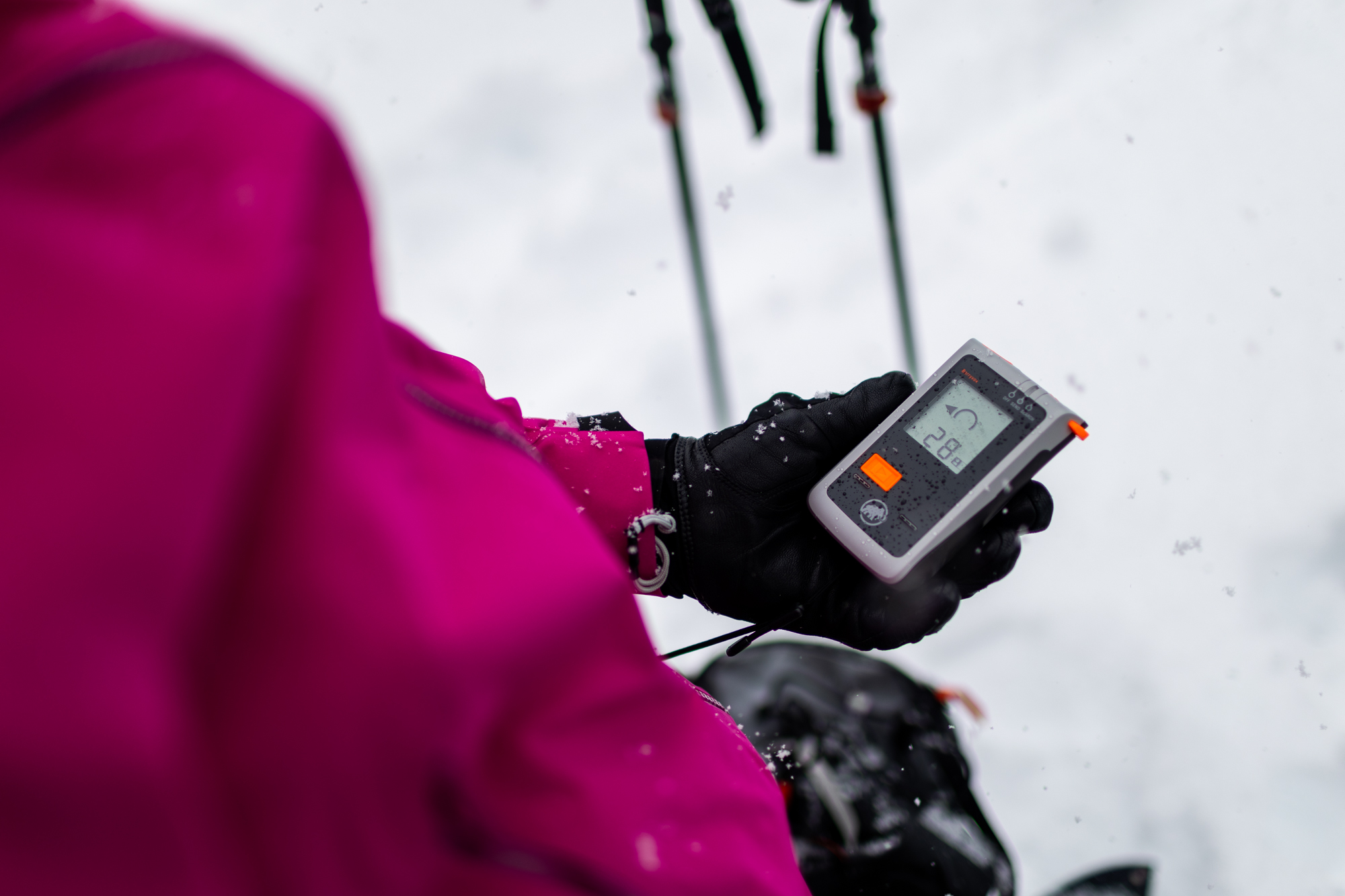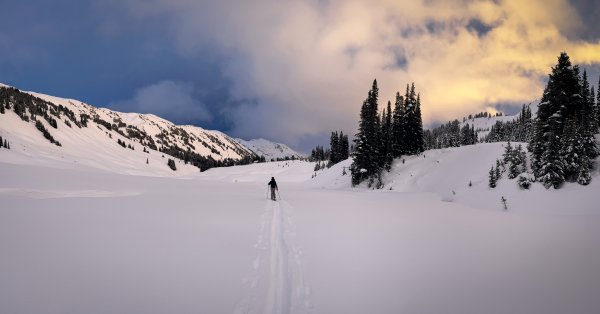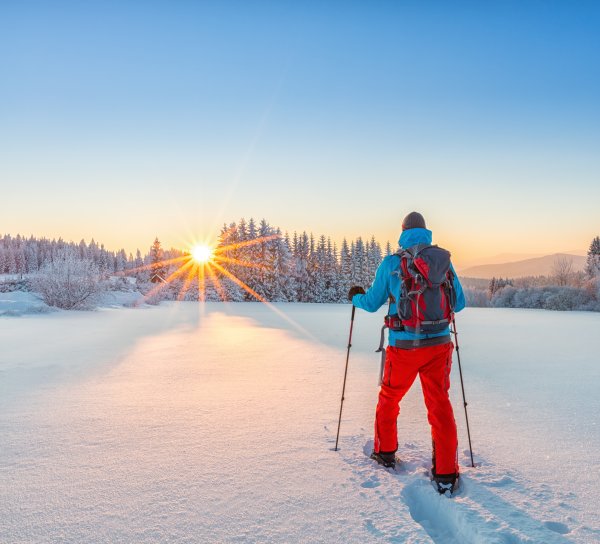Guest Post: Abby Cooper
Being consumed by an adventure is pure, it’s beautiful, it’s inspirational, but it can be straight-up rude if your consumption impacts others. Finding the line between having your own moment with the mountains and respecting others' intentions and safety with regard for your own can vary from clear as a bluebird day to murky as mud. In this blog, we’re defining how to respectfully adventure in the winter for the better of all who pursue it.
Respect is a hefty word. Understanding risk and being informed is Step One. Know and stay within your limits and obtain the skills necessary before you head out on your next winter backcountry adventure.
Think about how your actions impact others
It’s easy on any adventure to be consumed by whatever motivator got your bag packed and you out the door. Your personal pursuits are valid and an important part of your identity, but a holistic approach to any outing requires thinking beyond yourself. Our actions or lack of action affect the individuals we share the outing with playing into the group dynamic, they also people we don’t know but who are recreating in the same area, people that will experience that zone in the future, they impact the landscape land and of course, our actions can affect family and friends back home. Not every single action has this large of a ripple effect, but the greater the risk the bigger the ripples can be.
Frothing at the forecast, envisioning a great day ahead, the whirlwind of who, where, what time to meet tomorrow begins — engulfed by the good times ahead it’s easy to brush past the details - you’ve done this before, and there’s no need for lists and blogs about “how-to”.
Sorry, pause. Even the most seasoned of winter backcountry users have a daily process. Let’s talk about an outline for a healthy one.

Before: Trip Planning & Training
Your next winter adventure should always be rooted in the Three Ts: Trip Planning, Training, and Taking the Essentials. The rituals before an adventure build confidence for you and your crew. They don’t have to take forever, but they should not be missed.
Training & Skill Development
If you plan to head out for a snowshoe or micro-spike adventure check out AdventureSmart’s Snow Safety program. Before you go out into the backcountry during the winter, always make sure you have taken the proper Avalanche Safety Training. Even if you've already taken the training, it's still important to keep your skills up to date. Has it been several months or years since you were in the backcountry? Take a refresher avalanche course or practice a rescue scenario with your friends. First time traveling on ice this season? Practice some crevasse rescue in the living room.
Planning
This is the stage where route planning, understanding terrain and conditions, checking weather and learning about avalanche conditions and terrain is key.
- Check your objectives. Do you have the right training and experience to go into the backcountry? If your answer is no, check out the Skills section below.
- Check the avalanche forecast on Avalanche Canada, then monitor it leading up to your day in the backcountry.
- Check the weather using a reliable tool like Avalanche Canada’s Mountain Forecast, SpotWX, and Windy are just a few reliable tools.
- Navigation is key. Download any digital maps for the area you’re headed (Gaia GPS and CalTopo are a few options). It can also be a good idea to carry a compass and paper map, and know how to use them in the event your cell phone stops working for some reason.
- Alignment of group. Downright ask how everyone is feeling physically and mentally about what you’re going to do. It’s easier to get in alignment pre-trip than during. A great time to conversationally manage expectations as well.
- Discuss the “what ifs” in advance and talk about how you and your crew would handle different scenarios.
- Have a plan A, B and C noting that things can often change.
- Check your gear and ensure it works smoothly.
- Replenish first aid kit if needed.
- Pack The essentials, plus all necessary winter-related gear appropriate for your adventure.
- Leave a trip plan. Have a check-in person and leave a trip plan (that includes variations) with someone reliable. Pro tip: BC AdventureSmart has a great trip planning app! Planning a search and rescue effort starts with assessing the subject’s destination, probable route, and likely location. if you stick to your trip plan, and are near your intended route, your chances of being found are good.
During: Etiquette, Communications & Observations
There are three key things to keeping your adventure on track for yourself, your crew and those around you.
Good etiquette
- Those traveling uphill have the right away - don’t drop in on people skinning or sledding up. If there is already a group on top of a line transitioning or preparing a descent, don’t start ascending until they’ve descended.
- High marking - don’t do this when people are in the runout zone or below you. Whether in your group or not, it's dangerous.
- Don’t bootpack in the skin track - if you are bootpacking, create a new bootpack line.
- Don’t blare music for all to hear, most people are in nature for nature, not your Spotify daylist.
- Don’t litter (duh!). Leave No Trace, always
- Don’t transition, pee or wait on the skin track or groomed trail if it’s a busy area, simply regroup to the side.
- Keep your gear tight - no rocketing water bottles of flying skis, please!
- It’s not mandatory but friendly hellos to those you’re passing are always encouraged to keep the outdoors approachable and friendly for all.
- If you dig a hole for profiles, sled recovery or for another reason fill it in - please don’t leave traps behind.
Communication (People)
Group
Even if there is some kind of “leader” within your group, all decisions should be chatted about as a group. Communication breakdown starts as soon as someone doesn’t feel part of the decision-making process. A group where everyone feels like they have a voice and open ears is ideal. That being said, if you’re a speedy or knowledgeable one, stop and check in on everyone - don’t do an “F.U. stop” where as soon as the slowest person arrives you leave again - this person doesn’t get a rest, able to do self care or a moment to formulate any thoughts to share. If you’re the slowest person, use your voice to carve out what you need - water, blister management, to better understand the terrain, a moment to share your thoughts or catch your breath. Whether you’re the fastest, the slowest or someone in between, asking how people are doing and feeling goes a long way in group cohesion and makes for better days and memories for all.
Others
See a crew headed in your direction in a parking lot or trail junction? Chat to them. See where they’re headed and if your traveling may affect each other. If nothing else, wish them a great day. If you bump into people who aren’t respecting your space to recreate safely, educate them in a kind manner - most people who are making you feel compromised although extremely frustrating, probably don’t know and wouldn’t knowingly put a stranger in danger. Community is better when we show up as people respecting people instead of trying to be anonymous.
Self
Not asking you to talk out loud here, but we are asking you to check in on yourself. How's your social and physical battery? Are you getting the hebejebes about anything? Did you fuel up? Maybe even some positive self-talk. Remember your reason for being out there and stay true to that instead of getting caught up by distractions or contagious feelings.
Communication (Devices)
Satellite Communications
Devices like InReach, Spot and Zoleo are considered primary devices because they are more durable and can provide immediate connection to Search & Rescue services, as well as your GPS coordinates.
Cell phones
Mobiles should be considered a secondary means of communication because they are susceptible to cold weather, batteries dying, damage, or getting lost/affected by the conditions.
Observations
The mountains are alive and so is the weather. Forecasts are forecasts and things can change slowly throughout the day or rapidly. Eyes up, voices up, take note of how observations can change your game plan. Observe crew dynamics too. while we’ve enchanted the topic of communication, sometimes a bit of observation before approaching a specific topic will be worth your while. Pivot as needed.

After
How do you really know you respected yourself, your crew, others and the mountains without a debrief? A good debrief builds stronger relationships and better practices in the mountains. Take the time over a parking lot beer or the drive into service to chat through these topics for confirmation.
- Identify what felt good - why? Was it because of good communication and good risk management or could this possibly be a false positive?
- Identify where you might benefit from personal growth be that training, more time on maps, or more inspirational snacks.
- Share what you saw, heard, and felt in a MIN report - all of this information betters our community and helps local Avalanche Canada forecasters.
Celebrate the successes, dry out the gear, and do it all again!
What to do in case of an emergency
As much as we’d like to hope they didn’t, incidents do happen in the backcountry. In fact there were 1,750 Search & Rescue incidents in BC in 2023. During the winter, snowmobilers are the most common user group requiring Search & Rescue in BC. The main reasons for rescue calls were injury, getting lost or disoriented and exceeding abilities.
Attention to detail, pre-trip, can help mitigate risks, help enthusiasts plan and be ready to respond to an emergency and know what to do in that situation. There are two things you need to do if an emergency arises:
- Stop, Think, Observe and Plan (S.T.O.P) before you do anything else
- Call 9-11 as soon as possible if you require Search & Rescue assistance
- There is no charge for an S.O.S. rescue call!
Thank you for taking the time to learn etiquette and take the initiative to respect the outdoors and each other while enjoying. We see you doing your part not to become a search and rescue statistic — keep up the good work!
Essential Resources
Motorsports and Offroading
Hiking
- BC AdventureSmart
- CWSAA - Alpine Responsibility Code
- Outdoor Recreation Council of BC - Recreate Responsibly
- BC Parks - Backcountry Visitor Guide
- BC Gov - Know the Rules for Rec Sites & Trails
- BCSARA - Outdoor Education
- Invasive Species Council of BC - Play Clean for Hikers
- AdventureSmart Trip Planning App
Skiing & Snowboarding
Related Impacts

1 Garbage And Human Waste
The improper disposal of human waste and garbage is harmful to humans, the environment, and wildlife.
- Face masks collected by Vancouver plogger David Papineau
- 40,000
- Kilograms of trash removed by Divers for Cleaner Lakes and Oceans since 2013
- 29,188

3 Unsafe Behaviour, Lack Of Preparedness
Unprepared outdoor adventurists put themselves and others at risk of becoming a Search & Rescue or death statistic.
- Search and Rescue incidents per year in BC
- 1,750
- Volunteer hours spent annually on SAR call-outs, training, administration and SAR prevention in 2022
- 441,019

4 Lack of Respect - People & Environment
From trampling on trails to human-caused wildfires, disrespectful behaviour is creating conflict between user groups and damage to the environment and communities.
- Percentage of human-caused wildfires in BC, down from 42% in 2023.
- 30%
